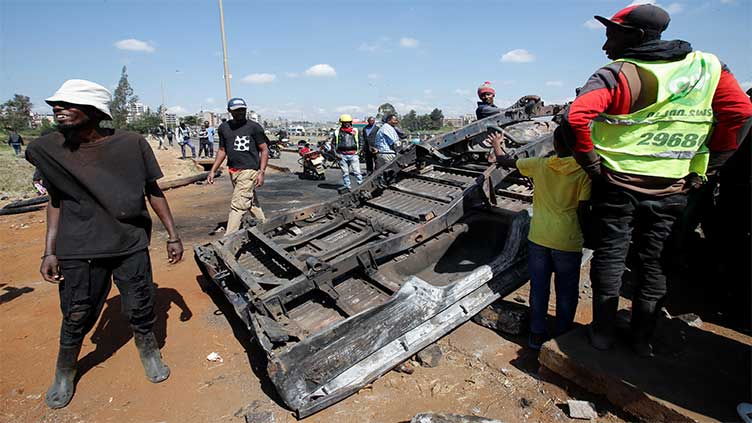Kenyan demonstrators call for president's resignation despite withdrawal of tax hike bill

World
The move will be seen as a major victory for a week-old, youth-led protest movement
NAIROBI (Reuters) – Protesters in Kenya are demanding the resignation of President William Ruto despite his decision on Wednesday to withdraw a controversial finance bill aimed at raising taxes to help relieve the country's debt burdens.
The bill sparked mass protests which saw police open fire on demonstrators, killing more than 20 people.
Kenyan police put up roadblocks on streets leading to the presidential palace on Thursday as some protesters vowed to "occupy State House" despite the president's climbdown on proposed tax hikes that sparked a week of demonstrations.
It was not clear how far protesters would be mollified by President William Ruto’s Wednesday decision to withdraw the finance bill a day after clashes killed at least 23 people and saw parliament being stormed briefly.
Ruto is grappling with the most serious crisis of his two-year-old presidency as the youth-led protest movement has grown rapidly from online condemnations of the tax hikes into mass rallies demanding a political overhaul.
Some protest supporters said their aims had been achieved and they would not demonstrate on Thursday.
"The enemy was the finance bill," one said in a post on X. "The enemy is crushed. What more do you want?"
But others pledged to press on, saying only Ruto's resignation would satisfy them.
"Right now is not about just the finance bill but about #RutoMustGo," one protester, Davis Tafari, told Reuters in a text message. "As political activists we have to make sure that Ruto and his MPs have resigned and fresh elections are held."
But some demonstrators said on social media that despite Ruto’s climbdown they would go ahead with a rally planned for Thursday, with many reiterating demands that he resign.
Ruto announced he would not sign a finance bill including the tax increases, a day after violent clashes between police and protesters at the assembly and nationwide left at least 23 people dead and scores wounded, according to medics.
“Listening keenly to the people of Kenya who have said loudly that they want nothing to do with this finance bill 2024, I concede. And therefore, I will not sign the 2024 finance bill, and it shall subsequently be withdrawn,” he said in a televised address with lawmakers, some clapping, seated behind him.
Vice President Rigathi Gachagua asked young people to call off the protests to avoid any further loss of life and destruction of property, and blamed the intelligence services for giving the government poor advice.
“There would have been no mayhem, but they slept on the job,” Gachagua said in a speech, calling on the head of the National Intelligence Service to resign.
Protesters were defiant, repeating calls for Ruto to step down and vowing further action in the streets.
Boniface Mwangi, a prominent social justice activist involved in the protests, called for a “1-million-people march”. “The arrogance is gone, but the lies are still there,” he said on social media platform X. “Yesterday they unleashed goons and police to kill peaceful protesters. That will not stop us.”
Other members of the protest movement continued to post on social media using the hashtag #tupatanethursday, or “see you on Thursday” in a mix of Swahili and English.
Ruto said he would now start a dialogue with Kenyan youth, without going into details, and work on austerity measures — beginning with cuts to the budget of the presidency — to make up the difference in the country’s finances.
He said the loss of life on Tuesday was “very unfortunate”. Kenyan police have not responded to requests for comment about the violence.
On Tuesday, police opened fire on crowds who massed around parliament and later broke into the senate chamber and national assembly, minutes after lawmakers had voted through the tax measures and sent them on to the president.
The Nation newspaper documented protests in at least 35 of Kenya’s 47 counties, from big cities to rural areas — even in Ruto’s hometown of Eldoret in his ethnic Kalenjin heartland.
At least 23 people were killed across the East African country and another 30 were being treated for bullet wounds, the Kenya Medical Association said on Wednesday. Medical officials in Nairobi said scores had been injured.
Heavily armed police patrolled the streets of the capital Nairobi, which were quieter than usual on Wednesday.


